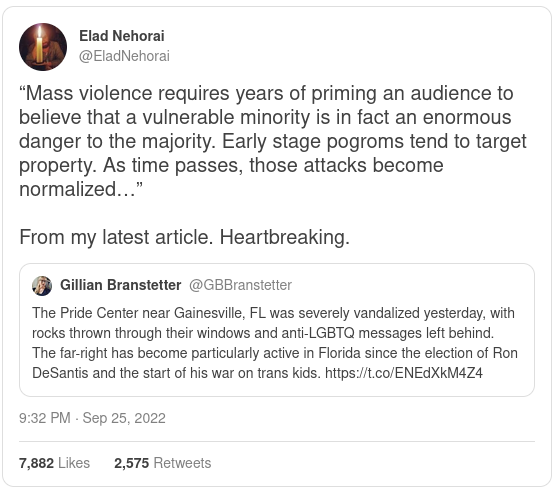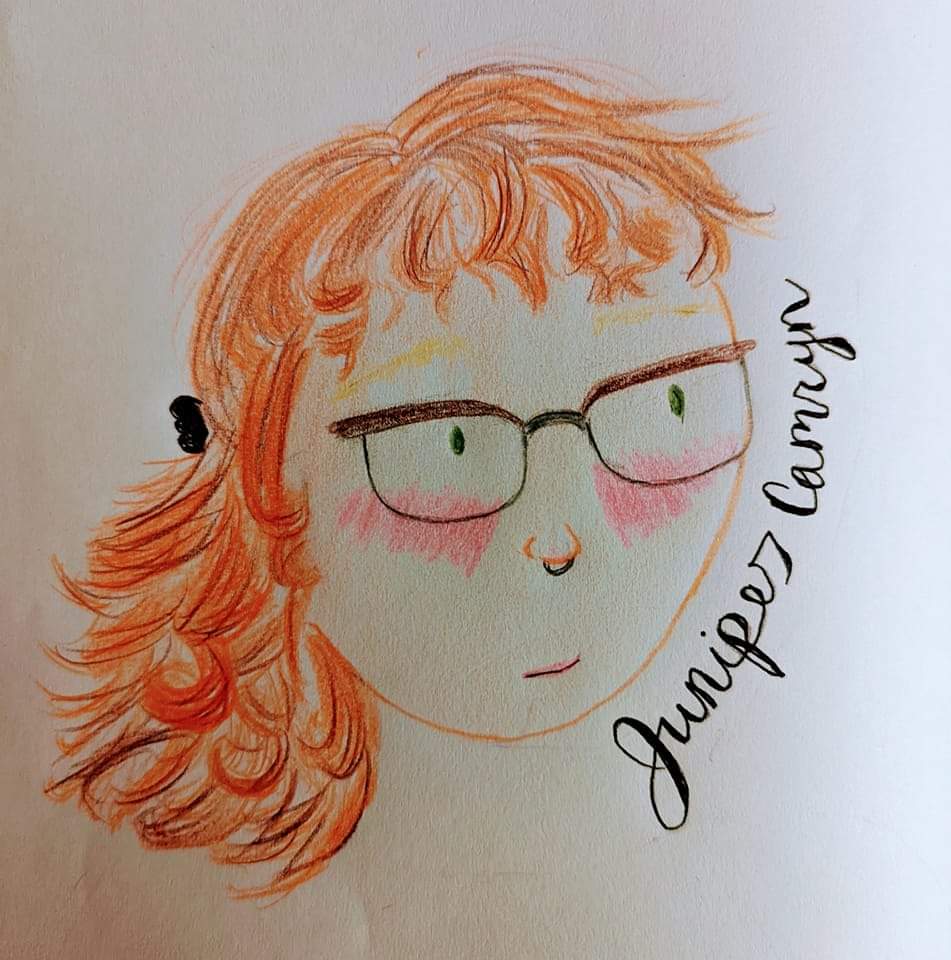On the persecution of trans people and the liberation of all.
In late May/early June of this year I returned to social media after a several month’s long break. One of the first things I noticed was that a huge surge of gender critical lines of thought had seemed to pop up out of nowhere on my feeds. At the time, my first reaction was that it felt strange and rude to be seeing, because these were things I have grappled with and come to terms with long ago. Come to terms with not in a fixed “I know the answers and they are all set in stone” sort of way but come to terms with in a “this is a complex issue and I, nor any human, will ever have an uncontestedly solid grasp on it, so I accept the nebulous nature of this all and withdraw the energy I was spending trying to figure it out,” sort of way.
It was distressing as well because it felt fundamentally at odds with a set of values that centers freedom, autonomy, and self-determination for all, and the kinds of people I saw saying, liking, and sharing these posts were people I had pinned as exactly those kinds of people. I guess the joke is on me for my continual struggle to see humans as anything less than the complex creatures we are.
I do things like this too, holding multiple complex/nuanced views that are at face value incompatible. It’s not something I think I’ve fully embraced about myself yet but I know every human does this in one way or another. I know that internal battles rage inside of me often trying to reconcile such things, and I often wonder what it would be like to just not care sometimes.
Growing cultural acceptance and understanding of trans and non-binary people has given me a lot of hope over the years that maybe society at large can move towards holding complexity. That maybe we can allow people self-determination and understand things like gender in the broader historical context they are situated in. Maybe we can move towards seeing ourselves from an outside perspective and it can aid us in releasing ourselves from the shackles of a past that used gender as an axis of rampant exploitation, as the foundation of a society built upon the unseen, unpaid labor of billions of women to keep our homes clean, put warm meals on the table, and raise our children safely to become useful workers who will support the growth of our capitalist economy and die in our wars of conquest. Maybe we could begin to see that just as it was with race, so it has been with gender- that our obsession with categorizing people into neat and distinct categories based on phenotypical characteristics, and rigidly enforcing deterministic sense-making of said categories has always had one end goal in mind: exploitation for the benefit of the capitalist class.
As frustrating as it had been to be watching this surge in gender critical lines of thought unfold on social media, part of me wondered if I should take a back seat for a minute and stop engaging. I’m not all that old at 32, but I am old enough to have watched the tides of discourse ebb and flow. I’ve seen social landscapes shift in real time, carving new lines of thought that would themselves go on to become irrelevant, seen in new and different lights as new perspectives and ideas emerge the way we all emerge into something new with the passage of time, rubbing our minds, bodies, and souls up against the winds of change. I thought perhaps this too will pass and we will all look back and see how naive it was to be asserting that we knew something about humanity that we do not in fact know.

Then one week on Twitter, the hashtag #mermaids was trending. I scrolled seeing surges of posts calling trans people and the medical professionals that support them pedophiles, child abusers, and groomers. The very same day, I saw a post with a video of an LGBT clinic that had had it’s windows smashed in in Florida. Writer Elad Nehorai had retweeted it with a quote from one of their own articles that read:
“Mass violence requires years of priming an audience to believe that a vulnerable minority is in fact an enormous danger to the majority. Early stage pogroms tend to target property. As time passes, those attacks become normalized…”
I have studied enough history to know that this is not fear mongering. This is established historical fact.
What seemed like potentially harmless exploration of what it means to be in biological bodies and make social meaning out of it suddenly hit me as much more grave and serious.
I wondered if those of us living in the mid-2000s had forgotten about the raging discourse around gay marriage in the United States. If we had forgotten that people called them mentally ill pedophiles and groomers too. If we had forgotten that people said it was a fad or a phase and that people shouldn’t be able to make life-altering decisions like committing to a marriage if they were going to change their mind, or if they could “get better” and assimilate into heterosexual society. Like we’d forgotten the seas of suicides and hate crimes that spoke to us about the consequences should we lose the battle for basic human freedoms
I understand well that the idea of transitioning and permanently changing your body is a terrifying prospect. I also understand that detransitioners are real and that they have to live with permanent decisions they’ve made and live on the other side of gender dysphoria. I have enormous sympathy for those that have lived this experience and honestly can’t imagine how painful it must be. It is distinct from being trans in that you’re not only living in a body that you don’t want to be living in, but you’re also living with the consequences of choices that you made, actions you took, to bring yourself there.
I have heard the argument often that perhaps people who transition were just mentally ill and needed some other kind of support, and I know that many detransitioners do in fact feel this was the case for them. I wonder though what the end game is of this line of logic. The conversations we have are often so subtle and coded. While there are many who are courageous enough to just come out and say it, many are not so bold to admit that they think gender transition should be abolished all together. And many very vocally believe in even tighter restrictions than there already are.
Functionally, complete trans erasure is in fact the end goal that this discourse has propped up. But much like many of us know is true about abortion- eradicating something or making it impossibly hard to access does not end the need for it, it only makes the lengths that people will go to receive it far more dangerous. And we have plentiful data to support that in the absence of supportive care, the likelihood of suicide skyrockets.
The cruelest thing about this is that, perhaps there truly are confused cis people struggling with mental illness who think transition will alleviate their pain and confusion. Yet barring them from competent care that affirms the existence of trans people only makes them more likely to pursue back alley avenues for transition themselves, or perhaps even take their own lives.
Even with the medical gatekeeping in place today, it is highly possible to know the correct narrative to move through the system and obtain the transition services they are seeking.
We have no way to truly filter out who is “really” trans, and who is just struggling with mental illness, or body image issues, or trauma, or whatever other reason someone might pursue transition without transness being the true root of their pain.
The only “solution” to this dilemma is to attempt to eradicate transness completely.
But there is no way to get around the fact that trans people exist, that they always have and always will exist, that their existence will be made known to cis people in some capacity at some time or another, and that people who aren’t trans may think they are trans, and end up making giant, life-altering mistakes thinking that they are.
In my view of it, we are at a cultural moment of extreme anxiety that medical technology can alter the courses of our lives forever.
In a way, it mirrors the terror of the realization that internet technology has created a world in which our mistakes, breakdowns, and moments of stupidity are permanent, with potential for all to see, forever.
We are in a battle with a world that asks us to be responsible for ourselves and our fates to a degree that is impossible as human beings. So we look to outsource that responsibility to people we hope can prevent us from making such mistakes, instead of finding grace and acceptance that this is simply what life is- bodies moving through time irreversibly, our past actions hanging upon us forever and leaving us only in the present moment to reconcile what we cannot take back, to repair what we can, to gently mold our lives into something we can look back on at the end and say “I did what I could.”
The discourse that I long to see is a discourse that centers our agency above all else. A discourse that asks us to look long and hard at the lives we are creating and take hold of them. A discourse that gives us ultimate power to decide what is correct for us, and does not lie to us about the terrifying truth that sometimes there are things we simply cannot take back.
I long to see a discourse that grapples with the complexity of being a biological life form with highly developed cognitive functions, attempting to make rational sense of a universe that is not rational. I long to see discourse that moves fluidly through the order and disarray of reality as we attempt to understand ourselves and each other.
And most of all I long to see a discourse that holds fervently the value of self-determination for all, and the right that each and every one of us have to struggle in relation to ourselves, to struggle in a fight to make meaning, and the right to be right or wrong about what conclusions we come to- be they transient or be they clung to our souls til the day our soul departs.
We have no right to determine what is true for any other. We have no right to bar others their journeys of exploration. We have no right to deny others’ laying claim to their own agency- looking at the decisions ahead of them, and weighing them holding the true gravity of their consequences for good or for bad.
The pursuit of persecution of trans people in this way is a pursuit to deny that we live in a reality that is not as simple to decipher as we wish it was. A pursuit to make lies and fantasies we’ve been sold true: that life is easy, answers are simple to come by, and that this certainty will protect us from having to live with the burden of the mistakes we make.
I do not believe that trans lives or the fundamental right to self-determination are acceptable costs to pay to prop up such an illusion.
